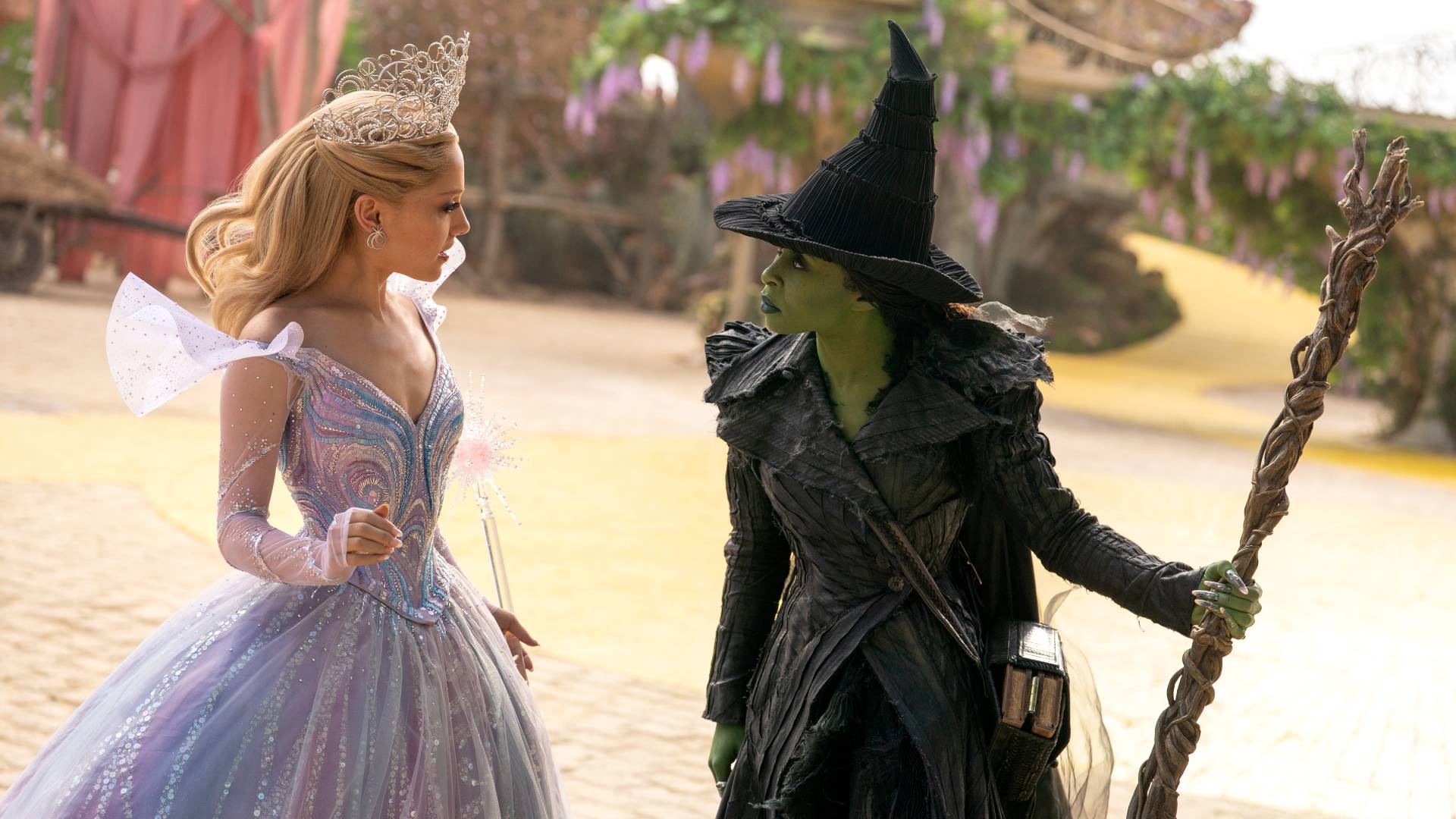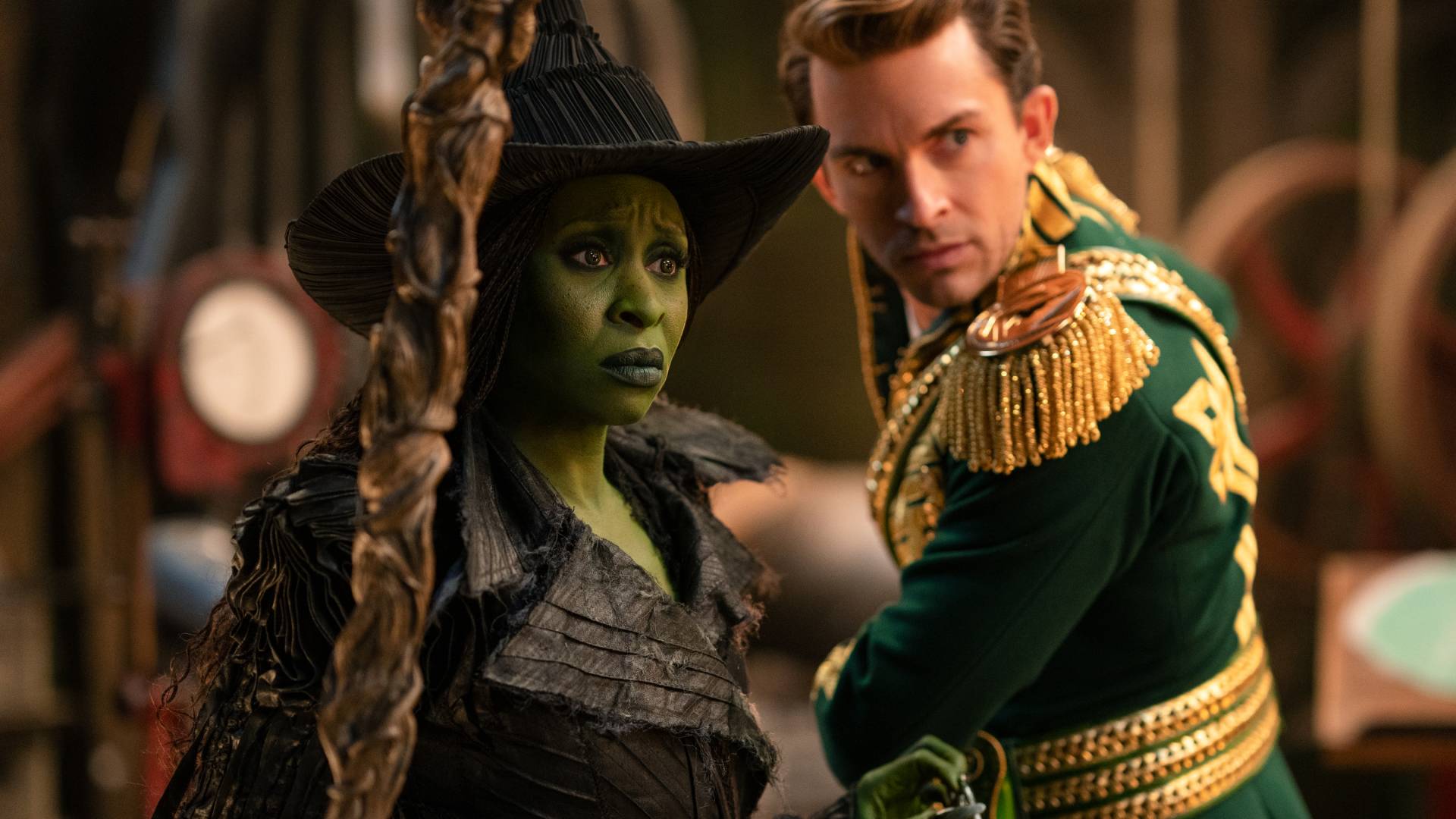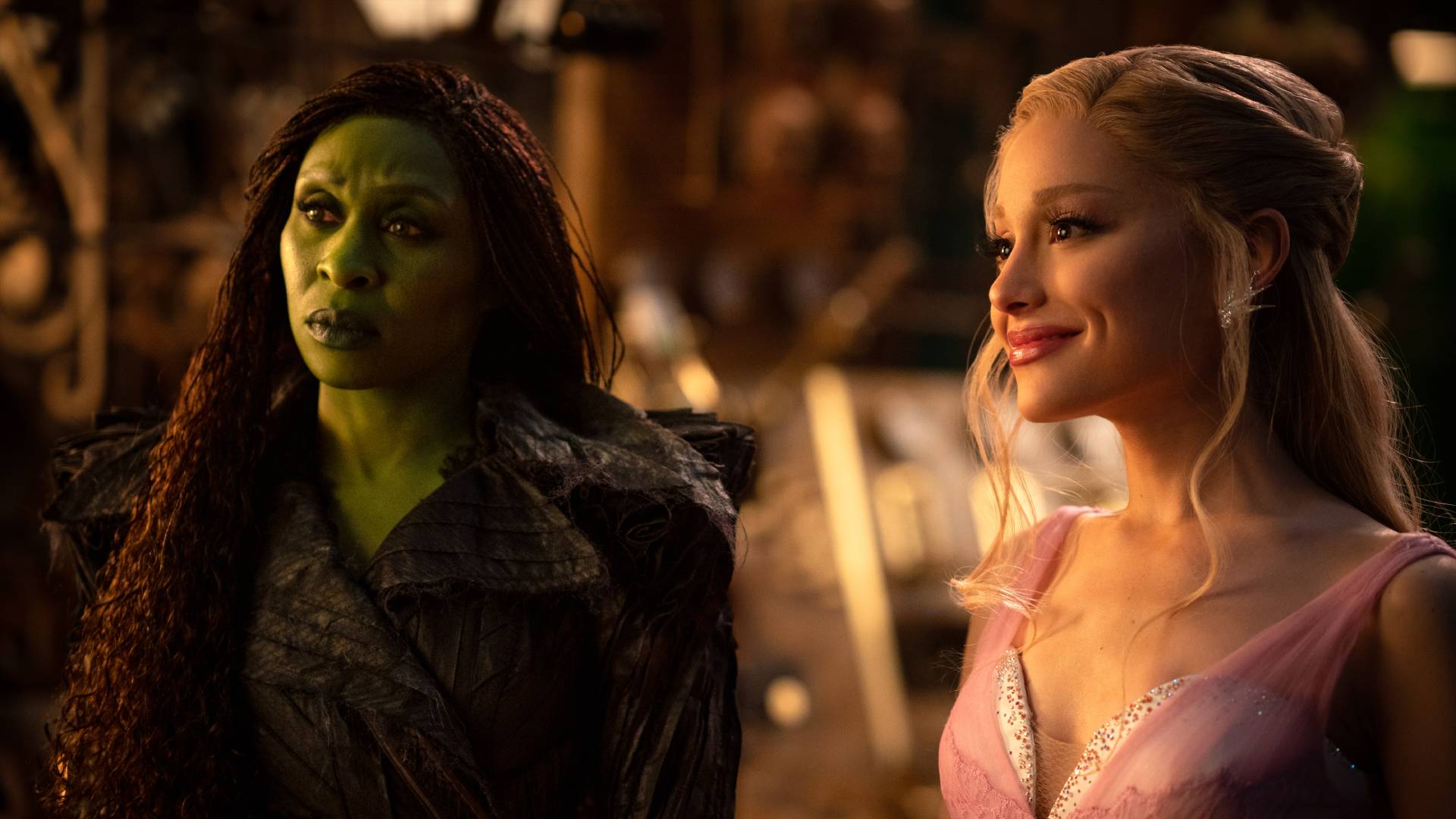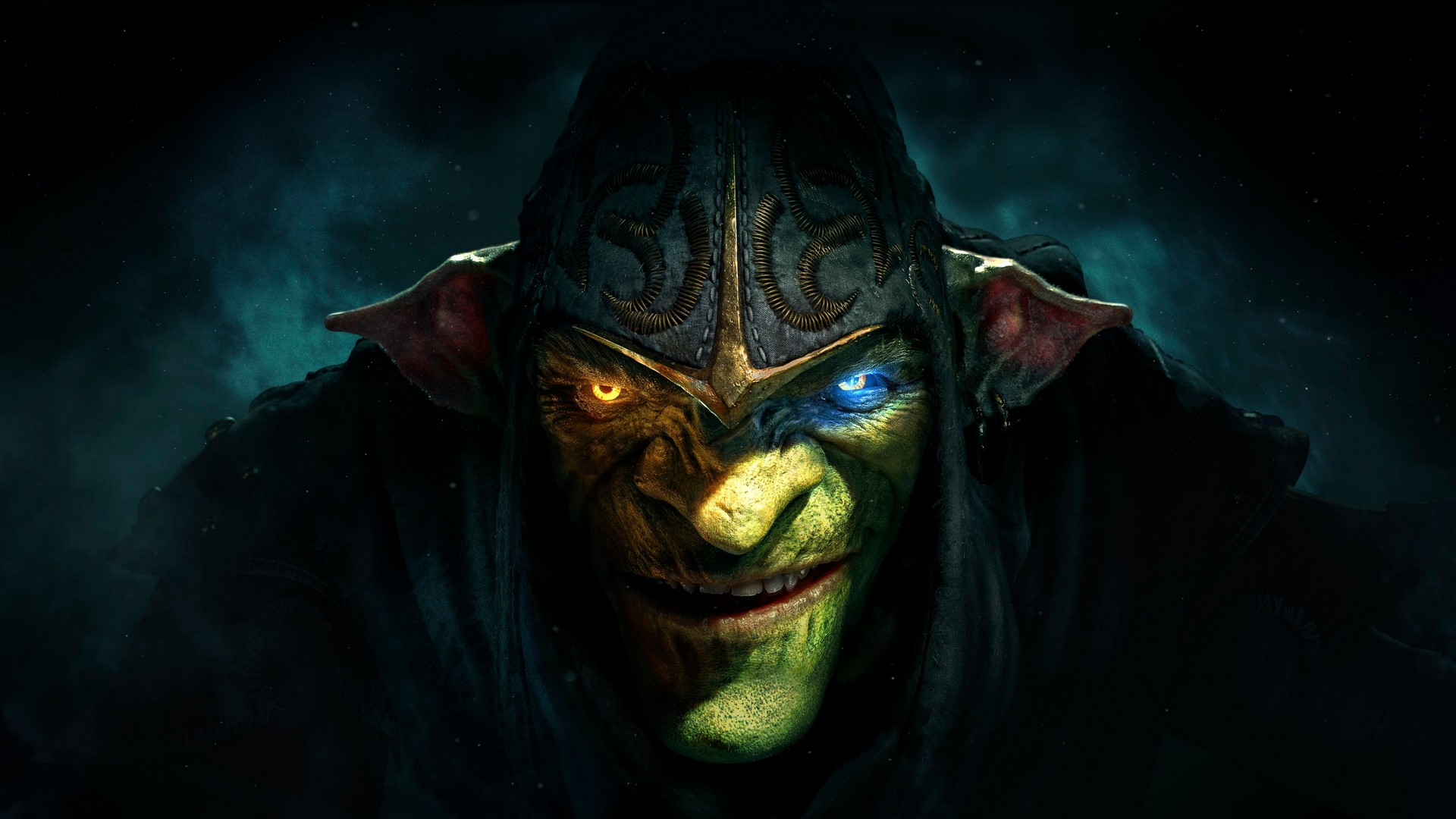GamesRadar+ Verdict
A darker and sadder Part 2 brings the story of Oz's witches to a moving close and cements Jon M. Chu's adaptation of Wicked as an absolute triumph. But, For Good suffers slightly from thinner source material and weak new songs.
Pros
- +
Excellent performances from Ariana Grande and Cynthia Erivo
- +
Willingness to remix the musical
- +
Beautiful set design and costuming
Cons
- -
New songs aren't as strong as the originals
- -
Story doesn't always flow as well as Part One
Why you can trust GamesRadar+
Wicked left the world on tenterhooks when it ended with Cynthia Erivo's Elphaba, the newly crowned (or hatted) Wicked Witch of the West, defying gravity and soaring into the sunset to continue her fight against the Wizard of Oz from the shadows. A year later, her story picks up again in Wicked: For Good, a much darker, more emotional Part Two that builds to an incredibly cathartic conclusion, though isn't quite as captivating as its predecessor.
After her dramatic exit from the Emerald City, all of Oz has been turned against Elphaba thanks to a ruthless propaganda campaign spearheaded by Michelle Yeoh's coldly devious Madame Morrible. While Jeff Goldblum's Wizard continues to pull strings from behind his curtain, the smiling face of Oz is Ariana Grande's Glinda the Good. Reluctantly at her side is her fiancé, the dashing Fiyero (Jonathan Bailey), who is unenthusiastically leading the hunt for Elphaba.
For Good dials up the intensity from the outset: this film leans far more heavily into its themes of propaganda and mass manipulation, as well as the subjugation of Oz's animal population. In the very first scene, the famous yellow brick road is under construction, but this is no fairy tale fun: chained animals are whipped to pull the heavy machinery laying the bricks. Luckily, Elphaba arrives to save them – but she's immediately pursued by the Emerald City's guards. Later, Elphaba's desperate attempt to make the citizens of Oz see that "our Wizard lies" is transformed by Morrible into a message reading "Oz dies," while posters of Elphaba looking terrifyingly twisted keep the Ozians whipped into a frenzy of hatred. It's clear the so-called Wicked Witch is fighting a losing battle.
Over the rainbow

Even the ever-cheerful Glinda isn't truly happy, as the multi-faceted 'Thank Goodness' proves. Here, Glinda admits to herself and a crowd of adoring Ozians that all her dreams coming true isn't quite playing out the way she imagined it would. Her engagement is a sham, her conscience plagues her, and Morrible treats her with disdain. Glinda still believes the situation can be easily fixed, however, which leads to one of the film's most inspired changes from the source material. When Elphaba calls in on the Wizard to threaten to expose him – which he is entirely unbothered by, because, as he sees it, he could tell Oz the truth and no one would believe him anyway, in a miserably timely exchange – Glinda pops up to try and smooth things over as only she can.
In the Broadway show, the following song, 'Wonderful,' is performed by only Elphaba and the Wizard, but here Glinda is present as the ultimate temptation for Elphaba to abandon her mission and join the emerald regime. Of course it would be Elphaba's truest (and only) friend who could sway her back towards the Wizard, and it's a bright spot of brief, fleeting joy, a poignant what-if, before the darkness returns when Elphaba once again realizes the Wizard is a cruel charlatan with no intention of changing for the better.
Indeed, Part Two is far less afraid to remix its source material than Part One, which is massively to the film's benefit. Act Two of the Broadway musical is a slight 60 minutes, but here the runtime is expanded to a hefty two hours and 17 minutes. In many places this simply allows the film more space to breathe, but in others, extra material is added – a new opening sequence reintroduces the core cast with snippets of Part One's instantly familiar songs, and there are two highly publicised brand new musical numbers for Elphaba and Glinda.
Release date: November 21
Available on: In theaters
Director: Jon M. Chu
Runtime: 2h 17m
However, despite the longer runtime, sometimes the progression of the plot is odd: Elphaba's sudden return to face the Wizard is jarring, and a dramatic scene between Elphaba, Fiyero, Glinda, and the Wizard feels far too brief for its importance to the plot. Similarly, a grim interlude with Marissa Bode's Nessarose and Ethan Slater's Boq feels oddly placed, but necessarily must come early for the rest of the film to make sense (a certain tornado is on the way, after all). Naturally these moments are taken directly from the musical, but more work was needed to make them run smoother on the screen.
Bringing all the latest movie news, features, and reviews to your inbox
For Good necessarily loses some of Part One's dazzle thanks to its darker subject matter, too, but it still finds time to wink at the audience by weaving in the storyline of The Wizard of Oz, taking its cues from the show. Perhaps this side of the story could have been fleshed out further (one might wonder why the Lion is so furious with Elphaba, for example: a few lines might suffice in the tight runtime of the show, but not here), which would help the film's uneven pacing. And, while it's undeniable that, combined, both films make for a brilliant adaptation, Part Two doesn't stand alone as easily as Part One.
The girl in the bubble

While Wicked felt like Elphaba's journey, For Good is very much Glinda's. Ariana Grande simply is Glinda, embodying the once-peppy good witch with every nose-scrunch, eyelash flutter, angelic highnote, and tearful look. If in Part One she brought the bubbly joy and levity, in Part Two, she brings the aching heartbreak, the sorrowful regret, and a great deal of the thematic driving force behind the concept of goodness: a huge part of Glinda's arc in the sequel revolves around how she wrestles with her complicity in the brutal regime persecuting her friend.
That doesn't mean Elphaba falls to the wayside, however. Erivo once again plays her not-so-wicked witch with a quiet, righteous anger, as well as a deep-rooted sadness and boundless empathy – though the more mischievous, smiling version of her is still there, too. A lot of her story this time involves Bailey's Fiyero and the illicit connection between them, building to a passionate performance of 'As Long as You're Mine,' in which the duo cross the line of no return. Their chemistry is palpable: Bailey brings a playfulness and magnetic quality to Fiyero that makes his and Elphaba's evolving relationship irresistibly believable, though it takes a backseat to the bond between Elphaba and Glinda.
'As Long as You're Mine' is one of the film's standout numbers, and For Good should hopefully bring an end to the frequent accusations that Act Two of the Broadway show lacks decent songs. 'No Good Deed' is another highlight, a late movie barnstormer full of desperation and self-loathing as Elphaba, on the brink of losing everything, laments that "no good deed goes unpunished." Here, the song is reconfigured to feature flashbacks to Elphaba's past 'sins' (as she sees them), heightening the inherent drama of the number. Sadly, though, both Elphaba and Glinda's new songs don't really hold a candle to the original music. 'No Place Like Home' sees Elphaba articulate why she wants to save Oz, even if it hates her, while 'Girl in the Bubble' is a sad, introspective song that voices Glinda's inner conflict. Both are ballads, and both could benefit from more oomph (even if 'No Place Like Home' allows Erivo to showcase her powerhouse vocals).
It's true that the music isn't quite as strong this time around; it's hard to follow up iconic numbers like 'Popular' and 'Defying Gravity,' of course. Still, Part Two builds to an immensely moving crescendo with 'For Good,' which gives this film its title – in fact, both films combined lead to this number as surely as the yellow brick road leads to the Wizard. This song is where both Grande and Erivo guarantee their Oscar nominations, as both actors overflow with all the anguish and gratitude of this bittersweet goodbye and ode to their unlikely friendship. 'For Good' is the beating heart of both films, and it has all the gravitas and heartstring-pulling power it needs to bring the entire auditorium to tears.
Changed for the better

For Good might not quite be the instant classic, endlessly rewatchable hit that was Wicked, then, but it still marks itself out as a worthy second half thanks to its superb lead performances, weighty emotional heft, and visual flair – the practical sets are spectacular and immersive (and far more welcome than even the most impressive CGI wizardry), and the costume design is exquisite, even if the characters have fewer outfit changes this time around.
Combined, Wicked Parts One and Two are an utter triumph at adapting one of the most beloved Broadway musicals ever to the screen, and director Jon M. Chu has glided over every obstacle that stood in his way as easily as Elphaba defied gravity. With pitch-perfect casting, beautiful scenery, and a deep reverence for the source material (as well as an admirable willingness to change what doesn't work), Chu has done what many thought was impossible – and that good deed shall surely go unpunished.
Wicked: For Good hits theaters this November 21. For more, see our guide to all the most exciting movie release dates to fill out your watchlist, or recap on the first film with our Wicked Part One ending explained.

I'm the Deputy Entertainment Editor here at GamesRadar+, covering all things film and TV for the site's Total Film and SFX sections. I previously worked on the Disney magazines team at Immediate Media, and also wrote on the CBeebies, MEGA!, and Star Wars Galaxy titles after graduating with a BA in English.
You must confirm your public display name before commenting
Please logout and then login again, you will then be prompted to enter your display name.



